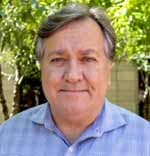Interviews
Four-time Pulitzer Winner David Barstow

David Barstow is chair of the Investigative Reporting Program at Berkeley Journalism and the first reporter in American history to win four Pulitzer Prizes. He earned those awards during a 20-year career at The New York Times. Before joining The New York Times in 1999, Barstow was a reporter for The St. Petersburg Times in Florida, where he was a finalist for Pulitzer Prizes three times. Before that, he was a reporter at The Rochester Times-Union in New York and the Green Bay Press-Gazette in Wisconsin. Barstow, a native of Concord, Mass., is a graduate of Northwestern University, which honored him with a Distinguished Alumni Award in 2010. He was interviewed via email.
JournalismJobs.com: What inspired you to become a journalist?
David Barstow: I'm a child of Watergate, and so certainly the example of Woodward and Bernstein was a powerful early influence. But I was also a total book-worm from an early age -- we lived just down the block from the local library -- and so I think I had some basic instinct that my life should somehow be connected to writing. And as a sports-obsessed teenager growing up just outside of Boston, I was also hooked on the incredible sports coverage in the Boston Globe. I remember thinking that being a sports reporter might just be the coolest gig of all time.
JournalismJobs.com: You are the first journalist in history to receive four Pulitzer Prizes in reporting categories. How does that feel?
David Barstow: Now that I've had the privilege of being a Pulitzer Prize judge several times, I honestly can't believe that I somehow managed to win even one Pulitzer. It is always breathtaking to see the depth and quality of the work that gets put up for consideration. I think what gives me the most joy is when young journalists tell me that a story I wrote inspired them in some way to join our tribe, or influenced their approach to investigative storytelling. That always feels like a bit of a full-circle moment when I think back to how Woodward and Bernstein inspired me.
JournalismJobs.com: Of all the investigative stories you've written, is there one that you're most proud of?
David Barstow: I'm often asked this question, and all I can say is that to me it always feels a little bit like being asked to pick your favorite child. The analogy isn't totally crazy. The act of reporting, writing and publishing investigative projects can feel a bit like the birth of a child. And once these stories are out in the world, there's never any predicting how they will turn out or what impact they might have on the world. Like my kids, I'm incredibly proud of all of them.
JournalismJobs.com: As a journalism professor, you now help students get published in places like The New York Times, The Washington Post and Los Angeles Times. Is that just as satisfying as writing a story yourself?
David Barstow: This was the biggest shock of all to me. As a reporter who spent 20 years at The New York Times, it always felt amazing, even a bit miraculous, when your editor came to you and said the magic words -- "They picked your story for Page One." But I'll never forget the first time an editor said those same magic words about a story by one of my students. I was over the moon, and each time it's happened since I can't wait to tell my students -- "Guess what, you are going to be on the front page of The New York Times." Such a treat for me.
JournalismJobs.com: In this time of AI, political polarization, threats to democracy and the decline of local news, what do you see as the biggest threat to investigative journalism?
David Barstow: I see a number of grave threats. First, the persistent efforts to label [journalists as] enemies of the people. Second, the fact that social media is the perfect delivery device for misinformation and disinformation. Third, the fact that AI now enables the mass production of really persuasive misinformation and disinformation. Fourth, the fact that the steady drip, drip of layoffs continues at far too many newsrooms. Fifth, our growing reliance on a limited pool of donors and benefactors. Sixth, the unrelenting efforts to chip away at transparency laws, whistleblower protections and laws that protect us from legal harassment. Seventh, the fact that it is getting increasingly difficult within this damaged ecosystem to be given the space, time and mentoring to learn the art of great investigative reporting.
JournalismJobs.com: Should journalists refrain from making political donations and voting in general elections to avoid the appearance of being biased?
David Barstow: I tell my students that this nation has a long and proud tradition of crusading investigative reporters who make no bones about their activism. Think Ida B. Wells. But this nation also has a long and proud tradition of investigative reporters who instead seek only to describe the world as it is, to hold up a mirror so we can see ourselves clearly, warts and all. Think Robert Caro. There are obviously many gradations in between, but the longer I do this work, the more I find myself most at ease in the Caro tradition.
Previous Interview:
David Nakamura, reporter, The Washington Post

